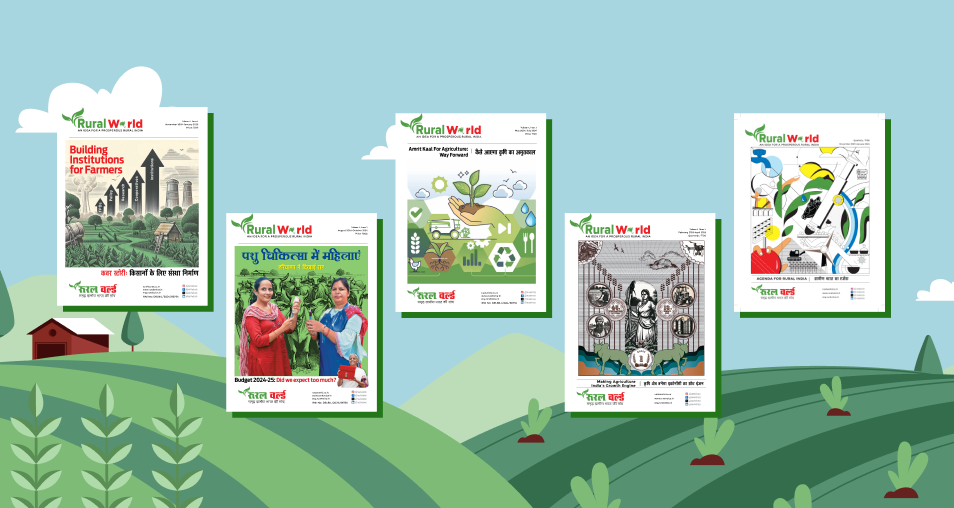Home > Agri Exports Realising $100 Billion Goal > Volume 2
APEDA Aims for $55 billion Exports by 2030: Abhishek Dev
India’s agricultural exports are entering an exciting new phase, driven by robust global demand, a diversified product portfolio, and an ambitious government target of reaching $100 billion in agri-exports in the coming years.

Team Rural World

India’s agricultural exports are entering an exciting new phase, driven by robust global demand, a diversified product portfolio, and an ambitious government target of reaching $100 billion in agri-exports in the coming years. At the heart of this transformative agenda is the Agricultural and Processed Food Products Export Development Authority (APEDA), which plays a pivotal role in promoting, facilitating, and expanding exports of scheduled agri and food products. In an exclusive interaction with Harvir Singh, Editor-in-Chief and Ajeet Singh, Executive Editor, Rural World, Abhishek Dev Chairman of APEDA shares key insights into the strategies being rolled out to scale up India’s agri-export footprint, the sectors that will fuel the next wave of growth, and the institutional efforts to ensure sustainability, quality, and market access.
Q India has set an ambitious target of achieving $100 billion in agricultural exports. What are the key strategies APEDA is implementing to reach this milestone?
As part of the broader national objective to achieve $100 billion in agricultural exports, APEDA has set a target of exporting more than $55 billion worth of its Scheduled products by 2030. To reach this milestone, the authority is pursuing several strategic initiatives, including targeted export promotion of key and high-potential products, as well as intensive efforts toward market diversification and deeper penetration into under-tapped but high-value markets such as the European Union, USA, UK, Oceania, Japan, and South Korea. To support these efforts, APEDA has onboarded ICRIER as a knowledge partner to carry out end-to-end value chain analysis for 20 key products. The analysis will help develop region- and country-specific export action plans. Simultaneously, APEDA is working on enhancing the branding and packaging of Indian agri-products to increase their global appeal and export value. Development of sea protocols for perishable products is underway to enable cost-effective and sustainable shipping to distant markets. Additionally, APEDA has established a Market Intelligence Cell in collaboration with CRISIL, which provides stakeholders with regular insights into key global and domestic developments impacting the agriculture sector.
Q Which specific sectors or products do you see driving the next phase of export growth? What are the untapped opportunities?
APEDA has identified a basket of highpotential product categories that are poised to drive the next phase of India’s agricultural export growth. Key focus areas include both Basmati and nonBasmati rice, as well as fresh fruits like banana, mango, pomegranate, grapes, and pineapple, all of which enjoy strong international demand. In vegetables, products like potato, green chili, ginger, and okra are considered priority commodities. The international appetite for processed and value-added foods—such as groundnuts, foxnuts (makhana), sauces, juices, papad, pasta, biscuits, confectionery, and alcoholic beverages—is another key growth driver. Animal products, including natural honey, dairy items (ghee, paneer), table eggs, and bovine meat, also show strong export promise. The cumulative export potential of these focus products is estimated to exceed $40 billion by 2030.
Q What are the biggest challenges in reaching the $100 billion export target?
Major challenges include infrastructure gaps such as an inadequate cold chain network and insufficient on-farm processing capabilities, which lead to wastage and reduced export quality. Additionally, the ongoing Red Sea crisis and geopolitical conflicts in the Middle East have escalated logistics costs, especially for air and ocean freight. Internal transport costs are also disproportionately high in regions like the North Eastern Region and landlocked states. Another challenge is the knowledge gap among farmers regarding Good Agricultural Practices (GAP), which results in the presence of pesticide residues and affects produce quality.
Q How was India’s performance in agricultural exports in 2024–25? What were the highlights?
India recorded a stellar performance in agricultural exports in 2024–25. Exports of APEDA's Scheduled products hit an all-time high of $27.9 billion. Leading the surge were non-Basmati rice ($6.5 billion), Basmati rice ($5.9 billion), and buffalo meat ($4.0 billion). Other significant contributions came from fresh fruits and vegetables ($2.06 billion), as well as cereal preparations, pulses, dairy products, processed vegetables, fruit juices, and cocoa products. Organic product exports rose by 35%, with notable growth across cereals, tea, essential oils, processed goods, and ayurvedic and medicinal products.
Q How is APEDA working to diversify India’s agricultural export markets beyond traditional destinations?
India’s agri-exports have traditionally focused on the Middle East, Africa, and parts of the Asia-Pacific. However, there is significant untapped potential in key markets such as Europe, the UK, Japan, Korea, and China. To capture these opportunities, APEDA is conducting detailed productmarket studies and identifying highpotential commodities for each target region. It also works closely with Indian embassies to gain market feedback and develop entry strategies in collaboration with exporters. In addition, APEDA promotes Indian products through participation in major international trade events like Gulfood (Dubai), BIOFACH (Germany), SIAL (Paris), ANUGA (Germany), Natural Product Expo West (USA), World Food India, INDUS Food, and AAHAR. It also organizes buyer-seller meets and trade delegations to connect Indian exporters with global buyers, including in the North Eastern Region. Q In some markets, quality remains a concern. How is APEDA helping farmers and exporters meet global standards? APEDA promotes the adoption of Good Agricultural Practices (GAP) and supports certifications such as GLOBALGAP to ensure compliance with sanitary and phytosanitary (SPS) standards required by importing countries. The authority also assists food processors and exporters in obtaining quality and food safety certifications to enhance global acceptance. It has implemented traceability systems for key products like grapes, peanuts, and organic goods—an initiative wellreceived by importing nations. To support quality assurance, APEDA has recognized 117 labs across India accredited under ISO 17025 by NABL, enabling reliable testing and certification of export-bound products.
Q Is there a focus on promoting organic and GI-tagged products in global markets?
Yes. APEDA prioritizes the promotion of organic and Geographical Indication (GI)-tagged products. The National Programme for Organic Production (NPOP) has been revised following stakeholder input, and efforts are ongoing to establish equivalency agreements with Australia, the USA, Japan, and New Zealand. A dedicated portal for organic export promotion has been launched, and APEDA continues to increase participation in international trade shows such as BioFach (Germany), Natural Product Expo West (USA), and the Organic and Natural Product Expo (Dubai). Under the “Brand India” campaign, APEDA has also partnered with IBEF to enhance the global identity of Indian organic products. As of now, 242 GI products are registered, reflecting India's rich agricultural and cultural heritage. Key GI exports include Basmati rice, several mango varieties, pineapples, onions, Sangli grapes, and North Eastern specialties like Joha rice, Black rice (Chak-Hao), and Mithila makhana. These products are exported to countries including the USA, UK, UAE, Iran, Iraq, Belgium, Germany, and Switzerland.
Q In the context of global trade tensions and US tariffs, what are the opportunities and challenges for Indian agri-exports?
Despite global trade tensions, Indian agricultural exports remain resilient due to their unique taste profiles and growing global preference for diverse and healthy foods. APEDA is confident that Indian agri-products will continue to perform well, though exporters must remain agile in responding to new trade dynamics. Q What policy interventions or incentives are needed to accelerate export growth? Key areas of focus include: Product-centric strategies: Export promotion across the full value chain for over 20 high-priority products such as bananas, rice, meat, and organic items. Branding: Market-specific promotional campaigns for Basmati rice, fruits, and organic products. Logistics: Implementation of sea protocols for perishables to reduce cost and improve efficiency.
Quality assurance: Adoption of GLOBAL GAP certification and product traceability systems. Infrastructure: Strengthening cold chains and supply networks through coordination with state and central agencies. Market access: Addressing SPS barriers and fast-tracking approvals in key importing nations.
Q How is APEDA aligning with India’s FTAs to boost exports?
APEDA collaborates closely with trade negotiators to align product promotion strategies with India’s FTAs. Postagreement, APEDA conducts training, outreach, and buyer-seller interactions to help exporters maximize opportunities emerging from tariff access and regulatory harmonization.
Q How is APEDA addressing sustainability issues like pesticide use, emissions, and biodiversity loss?
Sustainability is at the core of APEDA’s export promotion strategy. The agency encourages environmentally friendly farming practices, supports GAP certification, and promotes traceability to manage pesticide usage. These initiatives help India meet global sustainability benchmarks, enhancing the competitiveness of its exports.
Q How is APEDA supporting agristartups, FPOs, and cooperatives through technology and innovation?
APEDA is actively empowering agristartups, FPOs, and cooperatives through: Cluster-Based Promotion: Targeted export plans for high-potential agro-food clusters. Tech Integration: Support for traceability, smart packaging, and cold chains. Collaborations: MoUs with NABARD, SFAC, and NAFED to improve market access and capacity. Capacity Building: Over 879 training programs held in 2024–25, covering more than 78,000 stakeholders. Startup Support: Screening 500 startups, with 25 receiving intensive export and investment-readiness support. Financial Assistance Scheme (FAS): Support for export infrastructure, certification, traceability, and global market promotion.
Team Rural World


